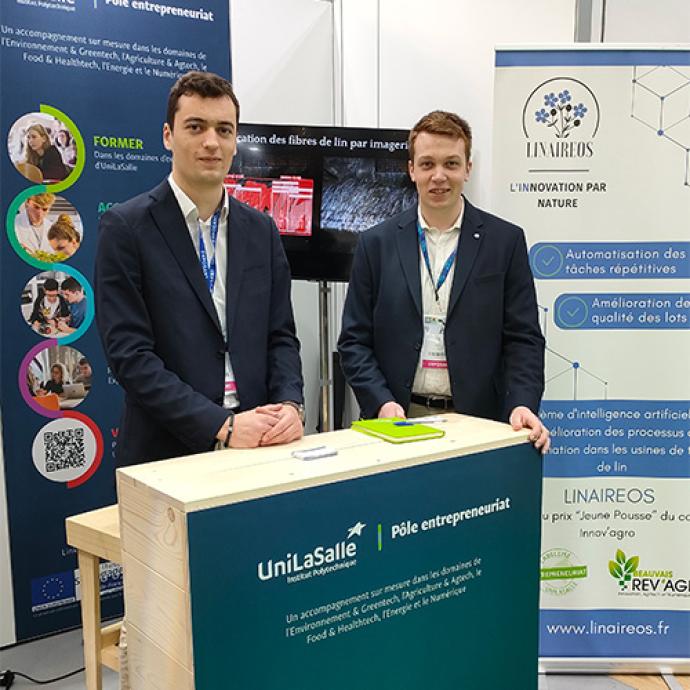Clément Letrez and Matthieu Déramond are developing a sorting system for flax and hemp fibers based on artificial intelligence.
Following on from the Rev'Agro Young Sprout Award and the Lions Club International District 103 North Business Creation in Respect of the Environment Award, the Linaireos project, developed by Clément Letrez and Matthieu Déramond, has won the 2nd Make IT Agri! prize.

"This is a great mark of recognition for us; it motivates us even more and allows us to move forward. We're proud to have been able to make people understand our project and the issues behind it."
A tool to facilitate the sorting of flax and hemp fibers
Linaireos is a tool that uses artificial intelligence to automate the sorting of flax and hemp fibers at the end of the scutching process. Scutching is a mechanical operation that separates the textile fibers from the flax or hemp straw. It is the first industrial stage after the harvesting of these textile crops. "Today, this operation is carried out manually. It's repetitive work, for which the flax industry is finding it hard to recruit," explains Matthieu. "Our tool will enable our future customers to gain in efficiency and productivity."
Behind this innovative project are two UniLaSalle Beauvais students, Clément Letrez and Matthieu Déramond. These two classmates are in their 4th year of an engineering program in Agronomy and Agro-industries, which they are following through an apprenticeship.
The two future engineers embarked on their entrepreneurial adventure just over a year ago, with the firm intention of finding innovative solutions for the natural fibers industry. "We both come from farming backgrounds, and Clément's parents are flax growers," adds Matthieu, who has family who also work with hemp.
The Make IT Agri jury chose to reward Linaireos in recognition of an exemplary project in the field of French excellence. Highly operational, it has already proved its effectiveness. Although it's a niche business, the project leaders already know all their customers. The project is mature and on the point of becoming a reality, with particular attention paid to the well-being of operators. Matthieu and Clément's high level of motivation and personal involvement also played a part.
A local ecosystem conducive to entrepreneurship
Launched at the beginning of May, the small company benefits from a whole local ecosystem to support its development. "We're based at Start Lab, the Beauvaisis business incubator and hotel, and incubated at iTerra. Our prototype optical sorter is housed at Lin2000 (an agricultural cooperative based in Grandvilliers). We still have to finalize the robotic part to separate the good fibers from the bad ones; for this we are working in cooperation with a design office. Finally, we've set up a sorting line at AgriLab."
The Linaireos project has been awarded the "UniLaSalle Entrepreneurship" label, enabling Clément and Matthieu to benefit from advice and support from UniLaSalle's Entrepreneurship cluster if required. The same applies to Rev'Agro, the Beauvaisis agricultural innovation cluster.
Make IT Agri, the student innovation competition combining agriculture and new technologies
For the past 6 years, Make IT Agri has enabled students from engineering schools, universities and veterinary colleges to contribute to sustainable agriculture and food production through a digital, robotic and IT innovation competition.
The aim? Accelerate transitions by improving practices, from field to plate.
Innovations can focus on different aspects, such as process improvement, the environment, economics, food safety and consumption patterns.
The Make IT Agri competition is organized by the Fondation Avril, in collaboration with the Académie d'Agriculture de France, the AgroParisTech engineering school, Terres Inovia, Terres Innovantes, TotalEnergies, Seenergi, Exxact Robotics and AgrOnov.






